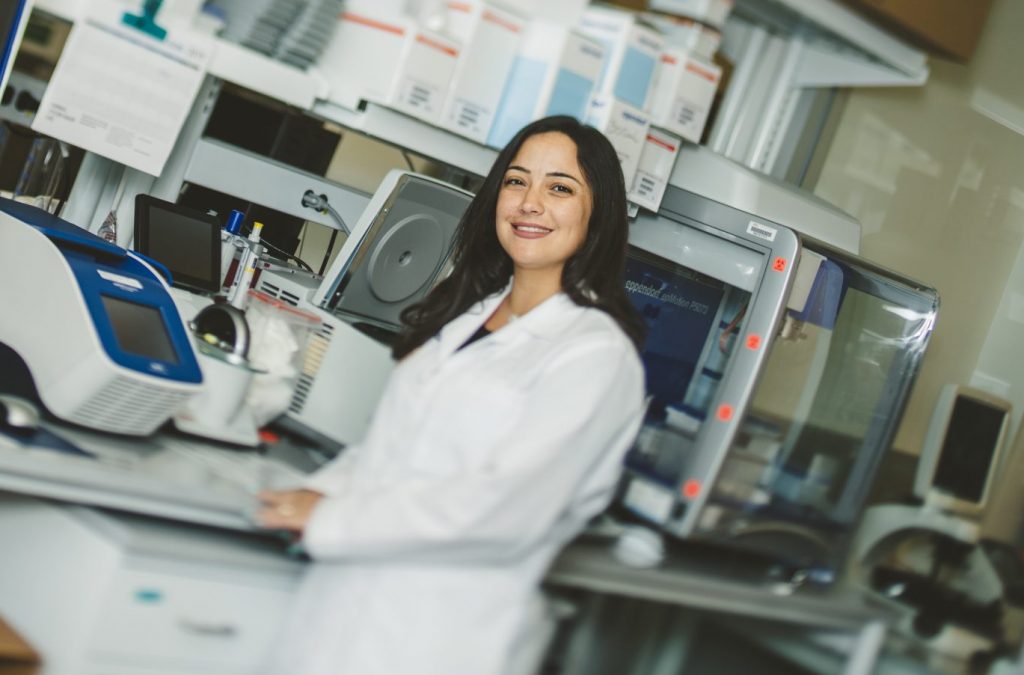The leading-edge research of FIU faculty member Diana Azzam is advancing the field of personalized cancer treatment. But were it not for a project when she was an undergraduate chemistry student in her native Lebanon, she may not have pursued her current work.
“I got involved in an observational study of incidences of cancer in a mountain area versus the city,” she recounted. “We found there was a higher incidence of prostate and breast cancers in the mountain areas compared to the city – which was a little surprising to me because you would think the city is more polluted while the mountain areas have a clean environment. We found levels of DDT, which had been banned five years earlier, in the water and in the soil. That explained the higher incidence of cancers in the mountain areas. For me, that stuck, and led me into cancer research.”
An assistant professor in the Department of Environmental Health Sciences at the Robert Stempel College of Public Health & Social Work, Azzam is engaged in three trial studies to implement personalized treatment options for cancer patients. She recently began collaborating with Cleveland Clinic Florida, the first research study FIU is conducting with the hospital, assessing the clinical utility of drug sensitivity testing and genomic profiling to treat sarcomas, one of the most common types of aggressive, malignant tumors.
The research, funded by a $350,000 grant from the Scott R. MacKenzie Foundation, focuses on the efficacy of a series of clinically approved compounds on tumor tissue samples. The drugs she determines to be most effective on the adult patient’s tumor cells will be used to guide treatments in the clinic.
“Our niche is providing funding very early on to researchers who show promise, but might not yet qualify for funding from larger sources, such as NIH (National Institutes of Health). We believe this project with FIU closely aligns with our overall mission of finding cures and look forward to watching Dr. Azzam’s research unfold,” said Scott MacKenzie, chairman and founder of The Scott R. MacKenzie Foundation.
Azzam is also conducting two studies with pediatric cancer patients at Nicklaus Children’s Hospital. One is funded by a $400,000 grant from the Cornelia T. Bailey Foundation while the other is backed by a $700,000 grant from the Florida Department of Health Live Like Bella Pediatric Cancer Research Initiative.
Azzam’s work aims to deliver tailored medical treatments based on a patient’s cancer genomic profile and drug response – an approach she calls “functional precision medicine” – by matching the patient and the cancer with the most effective personalized treatment to improve outcomes. For more than a decade, she has focused on the development of novel and more effective approaches for cancers that are difficult to treat.
Her lab – which includes a postdoctoral fellow, one graduate and four undergraduate students, and a research specialist – serves as training ground for those looking to launch their own research careers. In addition to studying the mechanisms responsible for the recurrence and resistance of aggressive cancers, the lab conducts research on the connections between arsenic in drinking water and cancer – a condition estimated to impact more than 130 million people around the world.
“The EPA (Environmental Protection Agency) limits levels of arsenic in water to very low levels, but we found that even at very low levels, chronic exposure may lead to cancer and other diseases,” Azzam explained.
While the three current clinical projects are pilot studies, limited to a small number of patients to demonstrate the feasibility and effectiveness of the personalized treatment approach, Azzam seeks support to expand her work – and help more cancer patients.
“Right now, with the equipment we have, we can only offer treatment options to one patient at a time and can only recruit patients who go to Cleveland Clinic or who go to Nicklaus Children’s Hospital. But we want to help more. Eventually, my goal is to scale up this work,” she said. “I have to expand the lab, acquire more state-of-the-art robotic instrumentation to process multiple patient samples at once. I will then be able to provide this type of treatment approach to all cancer patients.”

